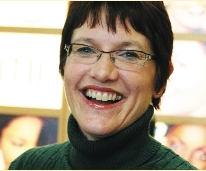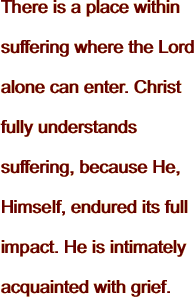HOME / PROCLAMATION! MAGAZINE / 2013 / SPRING / THE LIFE EXAMINED WITH CAROLYN MACOMBER
S P R I N G • 2 0 1 3
VOLUME 14, ISSUE 1
 D E P A R T M E N T S
D E P A R T M E N T S
The life EXAMINED with Carolyn Macomber
![]()
“Lord, please make it stop!” This prayer has been my heart’s cry over the last few months. In many ways it echoes the cries recorded in the Psalms. I have entered into a time of deep suffering—emotional, physical, and spiritual—the details of which are shared with a select few. I’m realizing, however, that suffering touches so many of us that I feel it would be helpful to make it the topic of my column.
Intense suffering can come in many forms: never being able to hug one’s child again; feeling alone in a marriage that wounds and tears; living with chronic pain or a disease that shames and humbles; losing one’s friends or family; struggling with financial burdens; living with trauma—and the list goes on. Jesus, however, does not leave us alone in our suffering but speaks to and enters into its depths. He, Himself, was considered a Man of Sorrows.
I have found that people often desire to lessen the suffering of another. Unfortunately, no one can truly lessen a friend’s suffering. Believers may try to bring meaning to suffering, believing that finding meaning behind the misery will somehow reduce it. In fact, many of us have endured people intoning, “All things work together for the good ....” Nevertheless, suffering is rarely reduced by trying to find meaning behind it; Job and his friends vividly demonstrated this fact.
I have often wondered if the words comforters speak during someone else’s suffering are more about their own discomfort than an honest desire to “weep with those who weep”. A friend of mine who has suffered greatly told me, “Just talk about suffering, and you’ll quickly watch people change the subject or leave the conversation entirely. They just want to run from the sufferer.”
The most helpful response when I suffer is a non-judgmental and listening ear, and when suffering is beyond words, then I cherish silent presence.
It has been said, “God doesn’t waste suffering.” Unfortunately, it becomes difficult to understand this platitude when the pain is unbearable. Nevertheless, I am beginning to view a treasure that can only come through suffering. Peter tells me in 1 Peter 1:6-7 that suffering produces a genuineness of faith that is much more valuable than gold, and faith is of high value to God. God’s economy is much different from mine. Therefore, it is a blessing when suffering comes, because it proves and produces in me that which is of great value to God.
James writes, “Consider it pure joy, my brothers and sisters, whenever you face trials of many kinds, because you know that the testing of your faith produces perseverance. Let perseverance finish its work so that you may be mature and complete, not lacking anything” (Jas. 1:3-4).
Joy and suffering seem more like boxing opponents than bedfellows. Yet Scripture places joy and suffering side by side and hand in hand. This joy, however, is not a masochistic pleasure in suffering. Rather, we are to realize that our suffering is an occasion through which God will grow our faith. When we experience trials, we can consider our suffering to be an occasion for rejoicing that God is proving our faith to be genuine—even when the pain is more intense than our feelings of faith.
Another byproduct of suffering is isolation. There is a place within suffering where the Lord alone can enter. Christ fully understands suffering, because He, Himself, endured its full impact. He is intimately acquainted with grief. For the joy of our salvation He endured the shame of the cross and a suffering we cannot begin to comprehend (Is. 53; Heb. 12:1-2). As long as I am His, I am never alone even though no other human can fully share my pain.
Christ is our very great reward despite the agonies of suffering (Gen. 15:1; Matt. 5:12; Heb. 11:26). When the pain is unbearable and the isolation is acute, do not forget there is a Friend Who knows, understands, and holds us in His hands. May He be glorified in and through our suffering. †

Copyright 2013 Life Assurance Ministries, Inc., Casa Grande, Arizona, USA. All rights reserved. Revised April 3, 2013. Contact email: proclamation@gmail.com
 Carolyn Macomber was a doctoral student at Andrews University when she discovered inconsistencies between Adventism and the Bible. She withdrew her membership from the Seventh-day Adventist Church in 2009. She is a member of The Chapel Evangelical Free Church in St. Joseph, Michigan, where she is the leader of a Former Adventist Fellowship. She works helping families prepare their children for school readiness, and she is a small group leader for Bible Study Fellowship in Granger, Indiana.
Carolyn Macomber was a doctoral student at Andrews University when she discovered inconsistencies between Adventism and the Bible. She withdrew her membership from the Seventh-day Adventist Church in 2009. She is a member of The Chapel Evangelical Free Church in St. Joseph, Michigan, where she is the leader of a Former Adventist Fellowship. She works helping families prepare their children for school readiness, and she is a small group leader for Bible Study Fellowship in Granger, Indiana.

